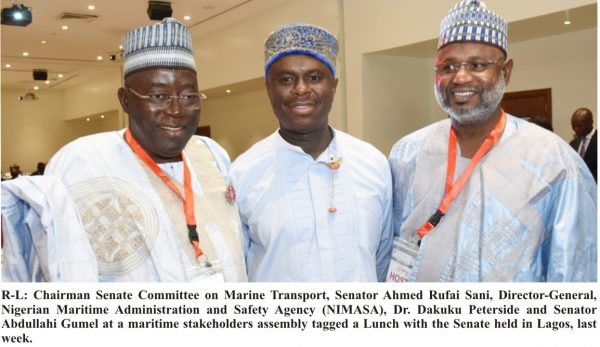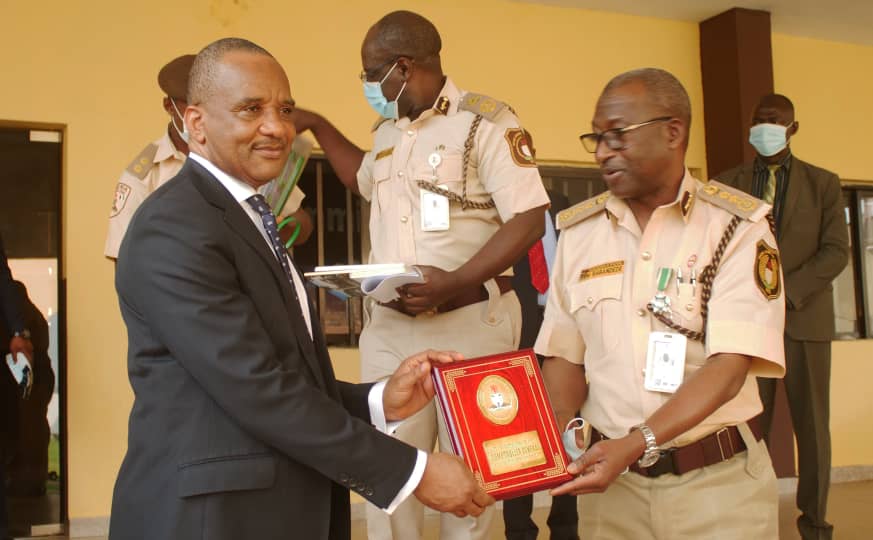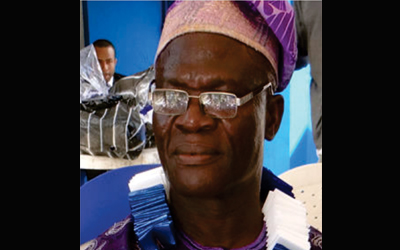Ship Owners, Terminal Operators Declare Nigeria’s Waterways Unsafe
·Pirates, problem of Eastern ports-BUA
· NIMASA must justify sea protection levy collection – Capt. Iheanacho
By Kenneth Jukpor
Nigerian territorial waters have become safe haven for pirates with the highest number of pirate incidents, despite the award of the security contract to an Isreali company and several assurances by the Nigerian Maritime Administration and Safety Agency (NIMASA) that the sea is safe for business.
Indigenous ship-owners in Nigeria have continued to pay colossal sums as Sea Protection levy while the nation’s waterways remain grossly unsafe and no change recorded in the sector to solve the problem for the last two years.
Recall that in August, the International Maritime Bureau (IMB), an arm of the International Chamber of Commerce, released its latest report on the state of piracy in the world for the first half of this year, which reported more incidents in Nigeria (31) than any other country.
The increase of piracy in the Gulf of Guinea (GoG) has led to higher shipping costs since vessels are now compelled to insure their crew aside paying for higher security costs and extra war risk insurance premiums for vessels coming to the region.
Describing this trend as “unacceptable”, the Director of IMB, Pottengal Mukundan said reports indicate more violence against ships and crews in the Gulf of Guinea, particularly around Nigeria than anywhere in the world.
Early this year, the United Nations Security Council disclosed that Nigeria is losing about $1.5 billion a month due to piracy, armed robbery at sea, smuggling and fuel supply fraud in the Gulf of Guinea (GoG).
According to Ambassador Michele J. Sison, the United States’ Deputy Representative to the UN, the root cause of piracy in the region are ineffective governance structures, weak rule of law, precarious legal frameworks and inadequate naval, coast guard, and maritime law enforcement.
“The absence of an effective maritime governance system, in particular, hampers freedom of movement in the region, disrupts trade and economic growth, and facilitates environmental crimes,” she said.
Meanwhile, the Director General of NIMASA, Dr. Dakuku Peterside has argued that the IMB’s statistics were misleading even as he admonished the bureau to ensure fairness and balance in its reportage of piracy issues on Nigeria’s territorial waters.
He referred to the IMB report as an exaggeration of reports on incidences on the country’s waterways.
According to Dakuku, even the slightest crimes in the creeks and habours of Nigeria were often reported as piracy by the IMB Piracy Reporting Centre.
He said: “Nigeria has made tremendous progress because we are putting a lot of effort and we are willing and determined to work with anybody who can assist us to ensure that the maritime space in Nigeria is safe and secure for everybody”
Although one can argue rightly that the NIMASA boss is better placed to ascertain the genuinity of the security or otherwise of Nigerian waters, Nigerian ship-owners tell a different story which validates IMB’s security report on Nigerian waters.
Speaking to MMS Plusrecently, the President of Nigerian Indigenous Ship-owners Association (NISA) Mr. Aminu Umar said there has been no change as the problem remained the same in the last two years.
“I’m not aware of the mechanisms in place to provide security for vessels on Nigerian waters. Today, all vessels heading to the Niger Delta area have to take security escorts in order to be safe. Most of us who have to deliver cargoes to customers in this region always come back with a negative balance sheet. You have to keep a distance from the coast of Nigeria in order to be safe. So, as a ship owner I don’t know what is going on” he told MMS Plus during an exclusive chat.
The NISA boss noted that he was planning to engage NIMASA to look at the security challenge and come up with system that would appeal to the ship owners.
“It’s not only security to terminals that are into oil upstream or exploration. What about the vessels transiting these areas? What kind of systems by way of security plan has been put in place? Few months ago, I learnt that the Federal Government engaged a private foreign company for this issue but we don’t know what the modus-operandi is. How do we contact the company or who do we call when we are in a distress situation? It is really an unfortunate situation” he said.
Speaking further, Aminu recalled a recent incident when his vessel was in distress but couldn’t get any form of aid from NIMASA or any other security agency.
“One of our vessels was in distress and there was no way of getting help to that vessel. NIMASA couldn’t help because they had no way of doing it. No government agency in Nigeria saddled with this responsibility was able to assist. We engaged NIMASA when it happened and they couldn’t do it. We are putting up a letter to the Director General of NIMASA to show what happened and stress that it is pertinent for them to put in place some measures to address such cases. We almost lost a vessel with about twenty-two lives because there was no way to get help across to them. On our own, we had to get a vessel to go there and rescue them. We have discovered that there is no system in place to address such problem. This isn’t the first time such thing happened and there was no way of getting assistance” he added.
According to Aminu, the incident occurred at the Agbamu area which is about 80miles off the coast of Nigeria and NIMASA, as the agency in-charge of maritime should be able to rescue any vessel within 200miles of Nigerian waters.
“Nigeria is a maritime nation with an average annual ship tonnage of 5000 vessels. This means about 15 to 20 vessels are expected in the country daily. There is no reason we shouldn’t plan for such emergencies. Again, Nigerian territory covers 200miles and if something happens at 80miles and we can’t respond then there is a problem” Aminu said.
Meanwhile, the Chairman of Integrated Oil and Gas Limited, Capt. Emmanuel Ihenacho maintained that; “Whosoever collects the Sea Protection levy has the duty and responsibility to provide safeguards for people who are operating in the area. I don’t really know why that isn’t the case because people aren’t getting the necessary benefit”
However, he stressed that piracy is a horrible crime and Nigeria should absolutely condemn it even as he revealed that he sometimes wonders if the issue isn’t over exaggerated.
“People have made allusions to people wishing to put insurance premiums on ships and crew coming to Nigeria and the issue may have been blown out of proportion. Wherever we come across pirates we have to absolutely exterminate them because they give the country a bad name. We also have to be worried that people are taking advantage of this problem to put up stories that allow them to take premiums that they don’t deserve” he told MMS Plus.
Speaking during the launch with the Senate Committee on Marine Transport on Thursday, last week, in Lagos, the representative of BUA Ports and Terminal Limited said that while the Lagos ports are saddled with the challenge of port access road and traffic congestion, the Eastern ports are battling with security problem and defective navigational aids.
He said that before now, many of the importers at the Eastern ports used gunboats but they now use armed guards to beat pirates on the sea at a fee paid to the security agencies.








